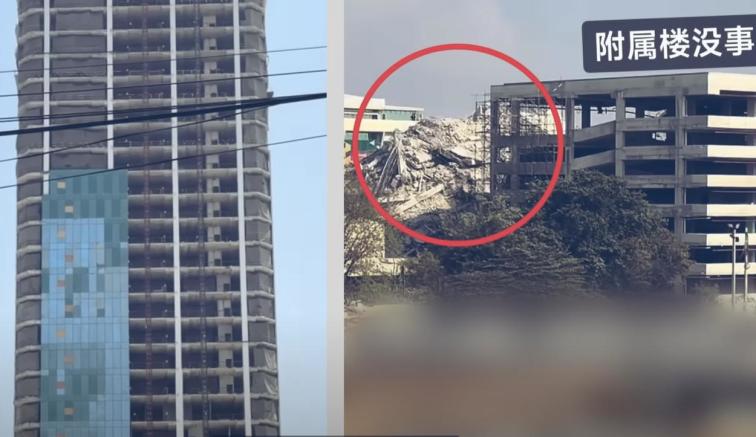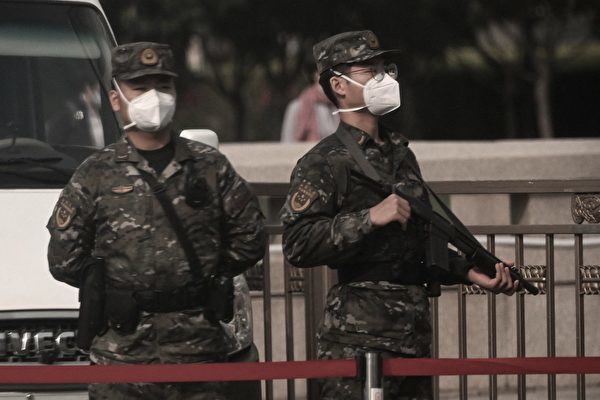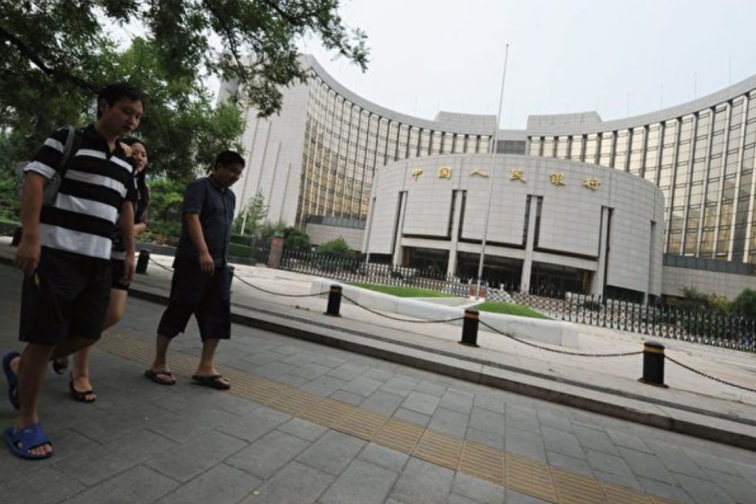On March 5, 2021, the day before the opening of the National People’s Congress in Beijing, severe air pollution covered the city as police officers patrolled Tiananmen Square with police dogs. (Photo by Kevin Frayer/Getty Images)
[People News] For years, the Chinese Communist Party (CCP) has used extreme nationalist propaganda and hate education to brainwash the Chinese population. One of its main objectives is to divert public dissatisfaction with life under the authoritarian regime, channeling frustrations toward other countries. At the same time, this approach reveals the CCP’s deep-seated insecurity about its own rule—it sees only enemies, never friends.
However, the prolonged exposure to extreme hate indoctrination has filled many citizens with hostility. Anti-Japanese and anti-American rhetoric has flooded online spaces, severely damaging China's investment environment and posing risks for foreigners living in the country. As a result, fewer foreigners are willing to work or invest in China. In recent years, several violent attacks, including murders targeting Americans and Japanese nationals, have been a direct consequence of this state-driven hate propaganda.
Meanwhile, the Xi Jinping administration’s excessive emphasis on national security, often using espionage charges to arbitrarily detain foreign nationals, has further deterred expatriates from working in China. Numerous cases of foreigners being detained without due process, coupled with an opaque judicial system, have led to a significant decline in the number of Japanese and other foreign nationals in China. This has placed Beijing in a predicament, with foreign businesses accelerating their departure from the country, further exacerbating China’s already sluggish economy.
According to Voice of America, citing Japan’s Mainichi Shimbun, at least 17 Japanese citizens have been detained in China since the enactment of its Anti-Espionage Law in 2014. As of now, five of them remain unable to return home.
Additionally, a series of attacks against Japanese nationals in 2024 resulted in casualties, severely undermining China's reputation as a relatively safe country.
As the spring rotation season approaches, the prevailing topic in the Japanese community in Beijing is not about how to better live and work in the city with new colleagues, but rather the growing reluctance among Japanese individuals to travel to China for business or to extend their stay. Some community members remark, 'Farewell parties are held as usual, but welcome parties are quite rare,' and 'I know foreign nationals who are returning home, but I've heard there are no successors.' Such conversations are frequently heard within Beijing's Japanese community.
The 'Statistics on Japanese Nationals Overseas' published by the Japanese Ministry of Foreign Affairs clearly indicates a decline in the number of Japanese residents in China. By October 2024, the estimated figure is around 97,538, reflecting a 4.2% decrease from the previous year and falling below the 100,000 threshold. Historically, China has been the second-largest destination for Japanese nationals living abroad, but it has now slipped to third place, overtaken by Australia, while the United States remains the top destination.
Japanese companies and government officials attribute this trend to several factors. In addition to the stagnation of the Chinese economy, there is a noticeable trend among companies to outsource work to local staff and reduce the number of expatriates. These structural changes have been further complicated by the detention of Japanese nationals on espionage charges and related attacks, which pose significant challenges for communication in the private sector.
Reports suggest that the leadership under Xi Jinping is urgently seeking foreign investment and business to stimulate the domestic economy. National leaders are engaging with heads of foreign companies to promote China's commitment to openness.
However, the Chinese Communist Party (CCP) authorities are simultaneously eager to attract foreign companies and talent while tightening control under the guise of 'national security'. They encourage citizens to report espionage activities and offer monetary rewards for such reports. This contradictory approach is akin to stepping on the gas and the brake at the same time.
During a meeting at the end of February, Xi Jinping (Xi Jinping) emphasized the need to prioritize political security and firmly protect regime security, reaffirming that the fundamental stance of prioritizing the stability of one-party rule remains unchanged.
The CCP's strategy of seeking foreign talent and investment while also cracking down on foreigners has resulted in negative repercussions. A source close to the Japanese government noted, 'Beyond the business community's cautious approach to China, many Japanese researchers are also refraining from traveling to China due to concerns.
Following the murder of Japanese nationals in Suzhou and Guangzhou last year, numerous overseas netizens criticized the CCP for employing extreme nationalism to indoctrinate its citizens, thereby sowing seeds of hatred among the Chinese populace.
A netizen named @Leva pointed out that the hate indoctrination by the Chinese Communist Party (CCP) has inflicted harm on foreign individuals, but the ones who have suffered even more are the Chinese people themselves. The post notes that many are shocked by the murder of Japanese children by Chinese individuals, with some attributing this to the CCP's propaganda that fosters hatred towards Japan. While it is true that the CCP promotes animosity towards the U.S. and Japan, it also incites hatred against 'landlords, rich individuals, counter-revolutionaries, and rightists,' as well as figures like Liu Shaoqi, Deng Xiaoping, Peng Dehuai, Xi Zhongxun, and the Gang of Four. There is also animosity towards 'real estate developers' and capitalists, and a deep-seated hatred for those who violate family planning policies, with a preference for rivers of blood over allowing one extra birth; better to have ten graves than one more person... The level of hatred is staggering! Taiwanese and Hong Kong individuals are looked down upon by mainland Chinese, and there is also propaganda that incites hatred against 'blind drifters.' The Hubei youth Sun Zhigang was treated as a 'blind drifter' and was beaten to death in a detention center. (Under the CCP's indoctrination), Chinese people not only harbor hatred but also engage in discrimination, particularly against the lower-end population. The Beijing municipal government refers to those struggling to make a living in the capital as 'low-end population.' Chinese people are even more likely to kill their own children; during the Cultural Revolution, there were incidents like the Daxing massacre in Beijing and the murder case in Daoxian, Hunan. Additionally, there have been frequent attacks on elementary school students at school gates since the Hu-Wen era, and now there are even cases of cars running them over. This systematic hate education has shaped the current Chinese populace and society. Figures like Zhang Xianzhong, Hong Xiuquan, and the Boxers were all individuals filled with hatred. It is not coincidental that such people emerge in Chinese society. In this context, I believe what the CCP's Ministry of Foreign Affairs states: the killing of Japanese by Chinese is an isolated incident, implying that the killing of Chinese by Chinese is a much more frequent occurrence.
A netizen known as '@tankman2002' commented: 'Hate education serves as the core propaganda for all totalitarian regimes throughout history. By continuously creating imaginary enemies for the public, such as imperialism, capitalists, class enemies, and spies, it enables the populace to overlook the real oppressors and deceivers in their lives. Once people recognize this truth, they may find themselves betrayed.'
As many Chinese citizens who have renounced their affiliations with the Communist Party, Youth League, and Young Pioneers have expressed, the Communist Party of China (CPC) is the most malevolent and inhumane authoritarian government in history. British psychic Parker noted in a program earlier this March that the CPC is likely to collapse due to an economic crisis this year. This illustrates that the CPC's indoctrination of hate ultimately harms both others and itself. The most prudent choice is to distance oneself from the CPC.











News magazine bootstrap themes!
I like this themes, fast loading and look profesional
Thank you Carlos!
You're welcome!
Please support me with give positive rating!
Yes Sure!